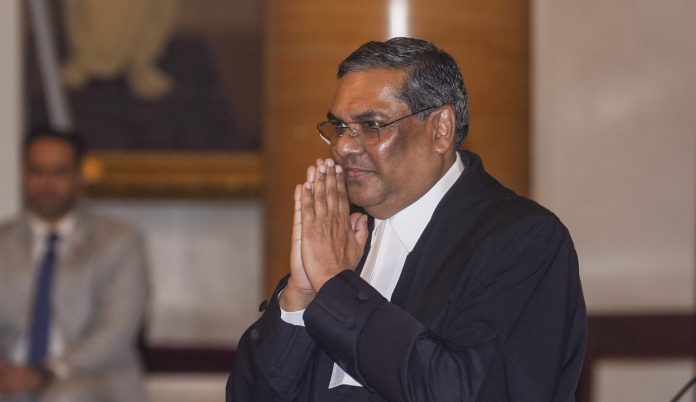Justice Sanjiv Khanna’s elevation as the 51st Chief Justice of India marks a new chapter in the Supreme Court’s judicial legacy. With a series of landmark verdicts and a reputation for judicial integrity, Justice Khanna steps into a role that will impact the nation’s legal and constitutional framework. Known for his deep understanding of the law, a keen sense of justice, and dedication to delivering timely verdicts, his tenure as CJI holds promise for critical reform in India’s judiciary.
Throughout his career, Justice Sanjiv Khanna has demonstrated a bold and progressive approach to landmark issues. Among his notable contributions, he was part of the five-judge bench that upheld the abrogation of Article 370, validating the removal of Jammu and Kashmir’s special status under the Constitution. The ruling reinforced the Centre’s authority to reorganise states under the Constitution, although it sparked debate over federal autonomy. His commitment to maintaining judicial independence and a balanced perspective was also evident when he declared the controversial electoral bond scheme unconstitutional, addressing concerns over anonymous funding in Indian elections. This judgement underlines his stance against opaque practices that can erode democratic principles. Justice Khanna’s rulings on election-related issues highlight his dedication to safeguarding democratic processes. His April 2023 judgement on the use of EVMs in elections affirmed their reliability, dismissing claims of potential manipulation. He underscored the importance of secure, modern electoral systems that mitigate the risks of booth capturing and fraudulent practices. This decision was a critical defence of India’s election infrastructure, reaffirming the judiciary’s support for modern, reliable technology in the democratic process.
In cases involving individual rights, Justice Khanna has exhibited a careful balance between freedom of expression and the right to life and liberty. His nuanced ruling in the case of news anchor Amish Devgan recognised the importance of freedom of speech but upheld the principle that this freedom should not compromise others’ rights. Justice Khanna’s swift action in granting interim bail to then Delhi Chief Minister Arvind Kejriwal in the excise policy case reflects his commitment to the fair use of judicial power. This bail allowed Kejriwal to campaign in the Lok Sabha elections, demonstrating Justice Khanna’s practical approach to ensuring justice without disrupting democratic engagement.
One of Justice Khanna’s priorities as CJI is reducing case backlogs and expediting justice delivery-a significant issue in India’s overburdened judicial system. With millions of cases pending, delay remains a systemic problem that compromises public faith in justice. Justice Khanna’s goal to streamline judicial processes and bring timely resolutions will likely define his tenure. His approach to justice – informed, balanced, and forward-thinking – indicates that he may leverage technology, promote alternative dispute resolution mechanisms, and push for judicial reform to address these challenges.
As Justice Sanjiv Khanna takes on the mantle of Chief Justice of India, he brings with him a legacy of courage, integrity, and progressive thinking. His judicial philosophy aligns with the fundamental principles of democracy, the rule of law, and individual rights. In the coming months, his tenure will face challenges, particularly in navigating contentious cases and institutional reform, yet his record suggests he is well-equipped to address them. Justice Khanna’s time as CJI may be brief, but it holds the potential for impactful change, which can have historical significance in the future.
Trending Now
E-Paper


